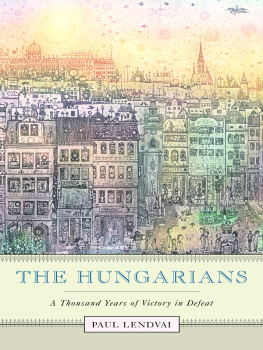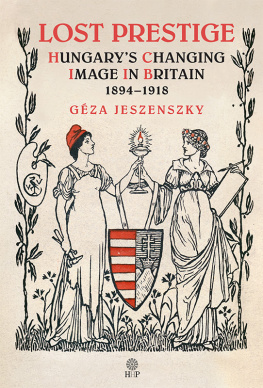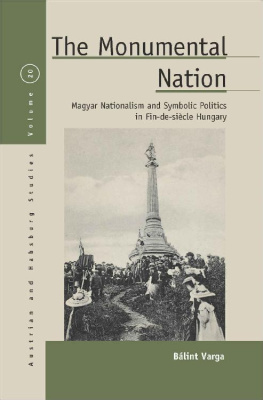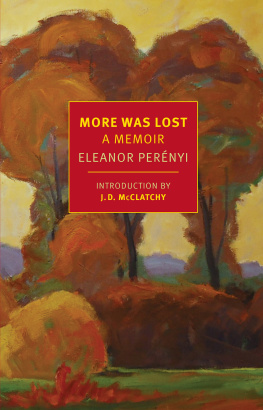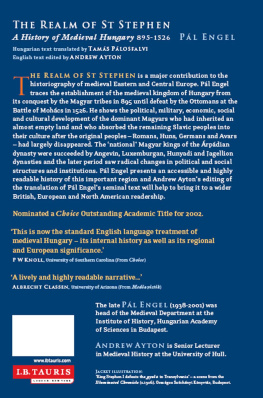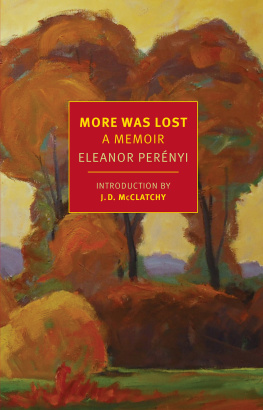Paul Lendvai - The Hungarians: A Thousand Years of Victory in Defeat
Here you can read online Paul Lendvai - The Hungarians: A Thousand Years of Victory in Defeat full text of the book (entire story) in english for free. Download pdf and epub, get meaning, cover and reviews about this ebook. year: 2004, publisher: Princeton University Press, genre: Art. Description of the work, (preface) as well as reviews are available. Best literature library LitArk.com created for fans of good reading and offers a wide selection of genres:
Romance novel
Science fiction
Adventure
Detective
Science
History
Home and family
Prose
Art
Politics
Computer
Non-fiction
Religion
Business
Children
Humor
Choose a favorite category and find really read worthwhile books. Enjoy immersion in the world of imagination, feel the emotions of the characters or learn something new for yourself, make an fascinating discovery.
- Book:The Hungarians: A Thousand Years of Victory in Defeat
- Author:
- Publisher:Princeton University Press
- Genre:
- Year:2004
- Rating:4 / 5
- Favourites:Add to favourites
- Your mark:
The Hungarians: A Thousand Years of Victory in Defeat: summary, description and annotation
We offer to read an annotation, description, summary or preface (depends on what the author of the book "The Hungarians: A Thousand Years of Victory in Defeat" wrote himself). If you haven't found the necessary information about the book — write in the comments, we will try to find it.
The Hungarians is the most comprehensive, clear-sighted, and absorbing history ever of a legendarily proud and passionate but lonely people. Much of Europe once knew them as child-devouring cannibals and bloodthirsty Huns. But it wasnt long before the Hungarians became steadfast defenders of the Christian West and fought heroic freedom struggles against the Tatars (1241), the Turks (16-18th centuries), and, among others, the Russians (1848-49 and 1956). Paul Lendvai tells the fascinating story of how the Hungarians, despite a string of catastrophes and their linguistic and cultural isolation, have survived as a nation-state for more than 1,000 years.
Lendvai, who fled Hungary in 1957, traces Hungarian politics, culture, economics, and emotions from the Magyars dramatic entry into the Carpathian Basin in 896 to the brink of the post-Cold War era. Hungarians are ever pondering what being Hungarian means and where they came from. Yet, argues Lendvai, Hungarian national identity is not only about ancestry or language but also an emotional sense of belonging. Hungarys famous poet-patriot, Sndor Petofi, was of Slovak descent, and Franz Liszt felt deeply Hungarian though he spoke only a few words of Hungarian. Through colorful anecdotes of heroes and traitors, victors and victims, geniuses and imposters, based in part on original archival research, Lendvai conveys the multifaceted interplay, on the grand stage of Hungarian history, of progressivism and economic modernization versus intolerance and narrow-minded nationalism.
He movingly describes the national trauma inflicted by the transfer of the historic Hungarian heartland of Transylvania to Romania under the terms of the Treaty of Trianon in 1920--a trauma that the passing of years has by no means lessened. The horrors of Nazi and Soviet Communist domination were no less appalling, as Lendvais restrained account makes clear, but are now part of history.
An unforgettable blend of eminent readability, vibrant humor, and meticulous scholarship, The Hungarians is a book without taboos or prejudices that at the same time offers an authoritative key to understanding how and why this isolated corner of Europe produced such a galaxy of great scientists, artists, and entrepreneurs.
Paul Lendvai: author's other books
Who wrote The Hungarians: A Thousand Years of Victory in Defeat? Find out the surname, the name of the author of the book and a list of all author's works by series.

